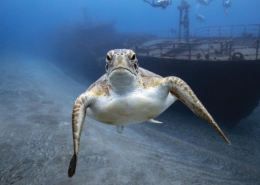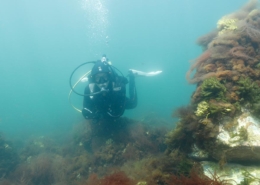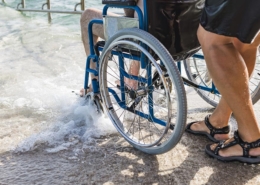Tips for Getting Along With Your Local Pools
By Charles Horton
I’ve worked in aquatics since 2004 and have been an active scuba diver since 2012. This has given me the unique position of understanding the needs of both sides when it comes to working together with local dive shops.
Scuba instructors need pools to teach confined water sessions. Pool operators can provide the space for these confined water sessions. I have found myself in the rare position of being intimately involved in the scheduling of both. As a result, I hope to be able to provide you with some tips that can make the relationship between diver and pool operator harmonious and beneficial to both parties.
Of course, confined water training is an essential part of any scuba course. These sessions provide a comfortable place to learn and practice skills. These become the foundation of a diver’s future experiences in open water. It is an opportunity for a diver to develop confidence before moving on to more complex environments. It affords instructors a far greater level of control than an open water setting can provide. Swimming pools are, in most cases, the ideal solution for our confined water sessions. Unfortunately not every instructor or shop has access to their own private pool.
So what’s a dive operator to do?
For the most part, access to aquatic facilities has never been easier. The need for aquatic programs and aquatic facilities is driving the construction of new pools across the country. Even many aging pools are getting facelifts or replacements. Local pools are usually only a short drive away from your shop.
Building good relationships with them can make a difference when it comes to the delicate art of reserving pool time. These tips just might see you getting your fins wet a little more often, and perhaps gaining more exposure for your business while you’re at it!
Pool chemistry and the two types of divers
“Welcome to our _ool! You’ll notice there’s no ‘p’ in there. Please help us keep it that way!”
It’s been said that there are two types of divers: Those who admit to peeing in their wetsuit and those who lie about it. Unlike in open water, “going Number One” brings only warm feelings and relief. Urinating in a chlorinated swimming pool, on the other hand, has consequences.
Rather than being destroyed by chlorine, urine can actually bond with it. This creates irritants known as chloramines. These chloramines are responsible for the unpleasant “pool odor” as well as the classic burning eyes and itchy skin, mistakenly associated with “too much chlorine.” Taking a bathroom break in an actual restroom rather than in the pool water is always a welcome custom. While it may be difficult, it is a good idea to build time into your pool sessions for at least one bathroom break. This will help alleviate or even possibly prevent chloramine buildup. It helps pool operators maintain properly balanced pool chemistry and makes for an overall more pleasant user experience. It’s also a great opportunity to practice your giant stride entry to get back in the water.
Aquatic programming vs. pool space
Running a pool can be an expensive prospect. The need for constant filtration, chemical monitoring, and adjustments, as well as facility staffing, can cause operating costs to quickly add up. Many pools (though not all) will try to recoup some of these costs through extensive programming. By filling the water space with as many activities as possible, throughout the day an aquatic facility can offset costs and perhaps even sometimes, dare I say it, make a profit. Unfortunately, in these cases, it can also mean less room for anything extra, including scuba.
Understanding that pool operators have other commitments to their programming first and foremost means being flexible when it comes to scheduling your confined water sessions. These facilities may leave times blocked off for rentals of pool space. These times may be private. This means your group will be the only ones using the pool. On the other hand, you may only be renting a lane or two at a time.
It is a good idea, and in some cases even downright necessary, to ask for pool rental availability many months in advance. Some Pool operators may even work out deals with dive stores to allow access to the pool before or after normal operating hours.
As an example, the facility I work for has reduced hours on Sundays from 1:00 until 6:30 p.m. This leaves early morning or late evening as a viable option for diver training. Depending on the facility, you may even be able to occupy the space at the bottom of the pool while other activities are taking place at the surface.
Make sure all equipment is clean ahead of time
Leave your muck at the dive site. Sand, mud, duckweed and any other debris that we pick up on our gear while diving can be an unattractive prospect when introduced to a swimming pool. Make sure your equipment is rinsed and clean before entering the building. In addition to dirt and debris, also be considerate of equipment contacting parts of the pool plaster and leaving marks or dings. This includes plastic cylinder boots leaving black marks and lead weights being dropped on pool surfaces. Failing to adhere to these simple, but important, guidelines can result in divers not being welcomed back.
Train the pool staff, too
Scuba training can consist of more than just teaching your students the basics of breathing underwater. Train pool staff in how to recognize and help treat dive-related emergencies. Consider meeting with aquatics staff and discussing what a typical scuba training involves and ways you can help each other out. Brief lifeguards and safety personnel on just what is expected of them during a scuba emergency. Make them aware of the location of your first aid and oxygen kits.
Similarly, you should be aware of the location of on-site emergency equipment within the facility, including AEDs. See whether the pool would be open to running a few in-water scenarios involving lifeguards and your instructors and divemasters. It’s likely that both teams will learn something from each other. You may even form a bond or two while you’re at it.
Proof of Insurance
Some aquatic facilities won’t even allow scuba diving instructors to wet the first fin blade without proof of liability insurance. Some will require being named as an additional insured. Be prepared to provide documentation your coverage.
Think proactively by going ahead and adding potential hosts to your insurance policy, even if you never blow bubbles there. This usually can be done with a simple email or phone call to your insurance provider and will make the dive professional look, well, like a professional. Be prepared to provide documentation as evidence of your coverage. This will also help the pool operator rest a little easier after agreeing to let you train in their waters.
You scratch my back, I scratch yours
Invite the aquatic staff to join the fun! Offer the occasional Scuba Discovery to pool staff. Consider offering discounted (or even free) to really sweeten the deal. I also offer discounted fees for any of my staff that wishes to take the Open Water Diver course.
Offer to help the pool with tasks such as to vacuuming the pool bottom after hours. Make yourself available to help with underwater inspections such as checking for leaks or securing drains and fittings. It will make you a valuable asset to the facility.
Important: Make certain that the circulation pump is disabled before attempting to work on any fittings.
Hopefully, these tips will help you create a fruitful and mutually beneficial relationship with your local pool and allow you the space you need to keep your divers in the water.










Laisser un commentaire
Voulez-vous participer à la discussion ?N'hésitez pas à contribuer !